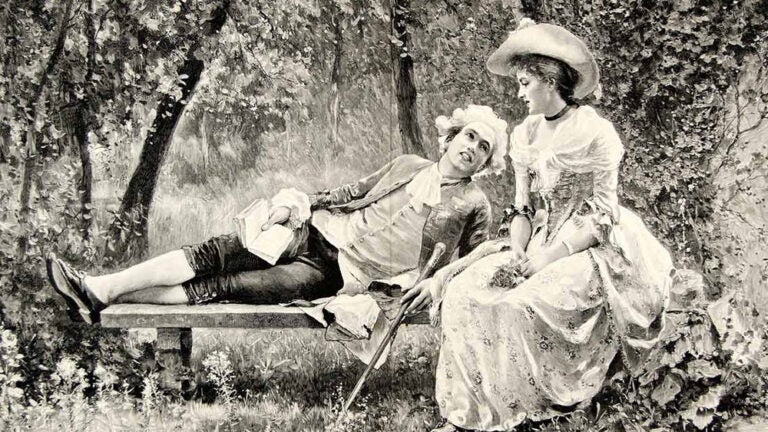
How to give a Valentine’s Day gift from your heart, not your wallet.
Amid the barrage of chintzy jewelry and mawkish greeting cards we face every February, it’s easy to lose sight of the overall purpose of Valentine’s Day — expressing love. While material items have transient lifespans — and often expiration dates — there’s one gift that will never fade: a love poem.
“Flowers will be dead in a week, chocolates come with dietary guilt, and those things are simply a function of money anyway,” said Dana Gioia, Judge Widney Professor of Poetry and Public Culture. “But if you write a poem to your beloved — even if it’s not a great poem — it’s a gift from the heart.”
In fact, the Latin word for poetry is carmen, which also means song, prayer or incantation.
“If you think about it, a love poem is a magic spell to make someone love you,” said Gioia, who in December was named California’s next poet laureate. “One of the most ancient purposes of poetry is to woo, and some of the oldest poems that survive are love poems.”
While Gioia is a professional poet — someone often paid to turn over polished verse on a dime — he confesses that romantic poetry is difficult even for him.
“It takes time, effort and emotion to write even a bad love poem,” said Gioia, who ended his newest volume 99 Poems: New & Selected (Graywolf Press) with a poignant poem to his wife of 35 years. The anthology is slated to be published this spring.
“Personal poetry is one of the most powerful and basic uses of the art,” he said. “It takes a different approach from writing a poem you want to publish in the New Yorker. But it’s no less powerful, no less genuine, no less important.”

Alas, there is no formula for writing the perfect love poem.
“By and large, a meaningful poem is involuntary,” Gioia said. “It either comes to you or it doesn’t.”
But if you want to increase your chances of inspiration, he suggested you set aside quiet time to think about the person you love — write down the words and images that come to mind. Then brainstorm the person’s specific attributes you find most endearing.
“It might lead you to something tender or to something funny, even,” Gioia said.
His second piece of advice is to keep it short.
“Don’t try to write an epic,” he said. “That’s one of the beauties of rhyme. It slows you down a little bit and allows you to constantly think about what you want to express.”
For those who are wary of their abilities, Gioia offers reassurance that most people with access to language can write poetry.
“In most societies throughout history, it was taken for granted that the power to write poetry was one of the rich roots of education,” Gioia said. “In 19th-century America, people had visitors’ books, and as you left their house you wrote a little poem.”
While writing love poetry may seem like a more obvious choice for those in the nascent stages of a relationship, Gioia stressed that capturing your feelings for someone to whom you’ve been married or dated for many years is perhaps even more important.
“The real question is, when the novelty begins to wear off and you begin to see the person more clearly, how do you keep the joy and enchantment going? That’s the hard part, but it’s also the good part,” Gioia said, recalling that his poem “Marriage of Many Years” sprang organically from the phrase, “Most of what happens happens beyond words.”
“Once I had the first line, the rest of the poem began to grow out of it,” he said.
The poem also served its purpose.
“I think she was touched because people who are married for many years always want to feel that they are still loved and cherished — so I believe it made her feel special.”
He added, “And if she didn’t feel that way, she was a great liar.”
For further inspiration, read Dana Gioia’s “Marriage of Many Years” in its entirety:
“Marriage of Many Years”
Most of what happens happens beyond words.
The lexicon of lip and fingertip
defies translation into common speech.
I recognize the musk of your dark hair.
It always thrills me, though I can’t describe it.
My finger on your thigh does not touch skin—
it touches your skin warming to my touch.
You are a language I have learned by heart.This intimate patois will vanish with us,
its only native speakers. Does it matter?
Our tribal chants, our dances round the fire
performed the sorcery we most required.
They bound us in a spell time could not break.
Let the young vaunt their ecstasy. We keep
our tribe of two in sovereign secrecy.
What must be lost was never lost on us.
From Dana Gioia’s upcoming book 99 Poems: New & Selected (Graywolf Press), which will be published this spring.